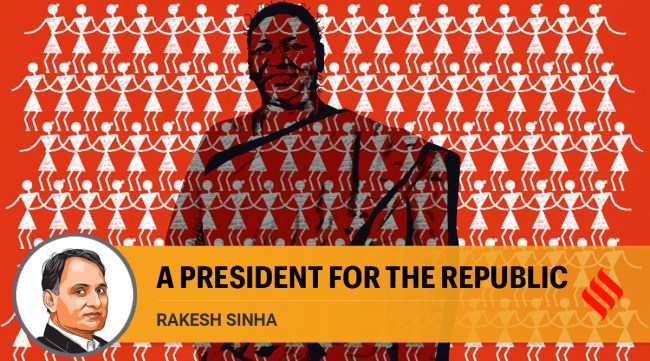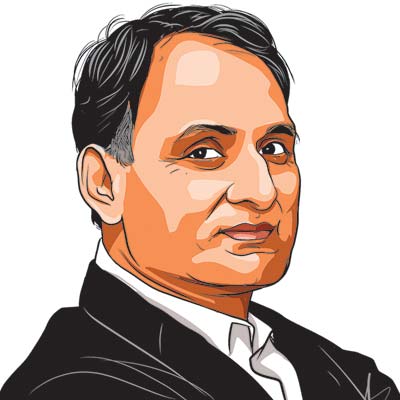Opinion Droupadi Murmu: A President for the Republic
Dr Rakesh Sinha writes: Droupadi Murmu’s election underlines the weakening grip of the elite on India’s political culture. It is a sign that its democracy is evolving beyond the European model.
 Opposition parties have failed to perceive that the horizontal expansion of democracy does not herald republicanism. B R Ambedkar had said that without social democracy, political democracy would remain hypocritical and lack the conviction required to bring about egalitarianism. (Illustration by C R Sasikumar)
Opposition parties have failed to perceive that the horizontal expansion of democracy does not herald republicanism. B R Ambedkar had said that without social democracy, political democracy would remain hypocritical and lack the conviction required to bring about egalitarianism. (Illustration by C R Sasikumar) What is the significance of Droupadi Murmu becoming President of India? The answer to this question has more to do with vital issues of social democracy and republican spirit than with ideological or political divides. The spotlight during presidential polls had so far been on the individual contestants and the process was seen as a test of the political hegemony of the ruling party. The debate now has shifted from personality-centred politics to republicanism. While the former indicates elitism, the latter is fundamentally associated with political activism at the grassroots.
This change also underlines the cardinal difference between the Nehru and Modi eras. Jawaharlal Nehru inaugurated the Indian sovereign democratic republic without disassociating with European values, which was a reason for his emphasis on remaining a part of the British Commonwealth — despite stiff nationalist opposition. Narendra Modi discarded European values imposed on Indian political processes. For him, politics is about the masses.
Murmu — as both a woman and tribal leader — has the exceptional advantage of understanding and experiencing grass roots-level democratic institutions, in which she has worked. She struggled in a system where social hierarchies and economic inequality worked against her. She belongs to the community of tribal people who constitute 8.6 per cent of India’s population and are spread across the country. This section of society has been the most marginalised since the colonial era. Tribal people’s per capita income, literacy rate, and health indices show their increasing marginalisation. The displacement of more than 50 lakh tribal people since Independence has aggravated their misery. However, their contributions to the freedom movement and national economy were as significant as any other section of society. From Tilka Majhi (Jharkhand) to Tirot Sing (Meghalaya), many displayed their patriotic fervour by standing against British colonialism.
The dignity of tribal communities was undermined by the colonial regime — they were contemptuously called “Animists” till the 1911 census. In addition to socio-economic upliftment, tribal communities needed recognition of their dignity and an appreciation of their role in national life. The Modi government declared the birth anniversary of Birsa Munda, the most revered nationalist tribal leader, as “Janjatiya Gaurav Divas”. Murmu’s election as President, then, is the realisation of an unaccomplished task of the Indian republic.
The powers and position of the Indian President prevent the office from becoming a power centre. It does, however, have a definite role as a symbol of republican virtue — a virtue that overcomes the limitations and compulsions of the party system. The President is, of course, a non-confrontational office. But, undeniably, it can be a vigilant custodian of the Constitution. The first President of India, Dr Rajendra Prasad, was a freedom fighter and Indian politics witnessed the battle between the then President and Prime Minister (Nehru) over their respective philosophies. The President’s office remained a captive of the ruling party when Indira Gandhi imposed Emergency in 1975. The office became the battleground when there was a split in the Congress in 1969 and both factions used the presidential election to prove their strength. Indira Gandhi’s choice — V V Giri — defeated the official candidate, N Sanjeeva Reddy, by a thin margin of about 15 thousand votes.
Murmu’s election is also significant because it challenges the elite domination of India’s political culture. This is one reason that our parliamentary democracy has not evolved. Democracy has, no doubt, expanded social horizons and embraced realities that are increasingly getting reflected in our discourses as well as in representation in legislatures. However, metropolitanism continues to hold sway. It is here that Modi’s leadership marks a great leap: It has been instrumental in deconstructing the elitist democracy. Murmu’s choice is intrinsically related to this process of democratisation.
The first sign was the democratisation of the Padma awards, which were earlier seen as the province of the eminent, shining stars from different fields. Since 2014, they have recognised common people, with uncommon accomplishments. Tulsi Gowda from the Halakki tribe, Meghalaya’s Trinity Saioo and Assam’s Jadav Payeng are now all Padma awardees. This is a recognition of the dignity of common people’s service to the nation. The Indian republic is a voluntary union of civilisational legacies and constitutional obligations. For decades, we remained captives of the European model and tried to evolve incrementally. But every society has to proceed in accordance with its demographic and cultural characteristics. Nelson Mandela changed the political culture of South Africa and the US took centuries to elect its first black president. This is a symptom of the limits of the European-Western model. India’s rich legacy of democracy, since the Vedic period, remained in the footnotes of our textbooks. Our republic will not be complete if we do not access our own civilisational legacies, beyond constitutional obligations. This began in 2014.
Opposition parties have failed to perceive that the horizontal expansion of democracy does not herald republicanism. B R Ambedkar had said that without social democracy, political democracy would remain hypocritical and lack the conviction required to bring about egalitarianism. A tribal woman being elected to the highest office is not a symbolic gesture or an apolitical elevation. It is a realisation of the country’s collective conscience that tribal communities deserve more than they have received from the Indian state. Therefore, her choice attracted the support of political parties which are opposed to the BJP. President Droupadi Murmu illustrates the advancement of social democracy.
Economic advancement or political participation is not the only criteria to fulfil the constitutional obligations towards a community. A recognition of their historical role and an appreciation of their social and cultural values are equally important. India’s huge tribal population now finds its role in the republican and democratic system of the nation recognised.
It is a devaluation of both the dignity of a community, as well as an undermining of its civilisational contributions when doubts are raised about the capability of a grass roots worker. Independence was won and the nation’s culture has been sustained by its grass roots.
The President’s office is above party politics. Despite the contest for the post, Murmu’s election shows the collective will of the people. As the President, she has to now live up to this trust. The election also shows that as democracy marches, it overcomes prejudices, destroys privileges and leaves behind politics shorn of ideas. This transformation in democratic thinking and process will have far-reaching effects. The opportunity arising from the discourse of the presidential election should be utilised for achieving the goals of social democracy.
The writer is a BJP Member of Parliament in the Rajya Sabha






